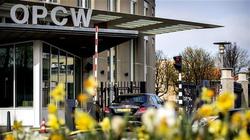 A high-ranking Syrian official criticized the Organization for the Prohibition of Chemical Weapons (OPCW), saying the intergovernmental body’s technical secretariat has to change its course and demonstrate impartiality, independence and objectivity in order to build up trust in its reports.
A high-ranking Syrian official criticized the Organization for the Prohibition of Chemical Weapons (OPCW), saying the intergovernmental body’s technical secretariat has to change its course and demonstrate impartiality, independence and objectivity in order to build up trust in its reports. RNA - Speaking at the 73rd session of the OPCW Executive Council in The Hague, Syria’s Permanent Representative to the organization, Bassam Sabbagh, slammed a number of “leaks” regarding the OPCW investigation into an alleged chemical attack in the town of Douma in April 2018, highlighting that internal documents and letters have been exchanged between members of the technical secretariat, presstv reported.
“Those documents reveal distortion of facts and manipulation of information,” Sabbagh said, warning against gross distortion of the Douma report and the extent of pressure being put on the OPCW.
The Syrian diplomat went on to say that OPCW’s technical secretariat is dogged to evade truth, turn a blind to distortion of facts, and manipulate information in the final report of the alleged chemical attack in Douma in Eastern Ghouta.
The alleged chemical “attack” on Douma occurred in April 2018 at a time when the Syrian army was about to win the battle against foreign-backed militants there.
The US and its allies blamed Damascus for the attack, an allegation strongly rejected by the Syrian government that said foreign-backed militants with the Western-supported White Helmets “aid group” had staged the chemical attack in an attempt to frame Damascus.
Sabbagh underlined that such practices reflect the high level of unprofessionalism inside the OPCW.
He stressed that the Damascus government strongly condemns the use of chemical weapons in any place and under any circumstances, noting that Syrian authorities have on occasions warned against the escalation of international terrorism, and terrorist groups’ possession of toxic materials and chemical weapons.
“Syria is determined to offer the utmost forms of cooperation with the OPCW’s technical secretariat, and it has welcomed visits by the organization’s teams to Syria,” Sabbagh said, stressing that certain measures need to be taken in order to evaluate security situation in any Syrian territory.
He underscored Syria’s commitment to fulfill its obligations and to cooperate with the OPCW’s technical secretariat away from preconditions, pressure, politicization or suspicions raised by the US and its allies.
The Syrian government surrendered its stockpiles of chemical weapons in 2014 to a joint mission led by the UN and the OPCW, which oversaw the destruction of the weaponry.
However, Western governments and their allies have never stopped pointing the finger at Damascus whenever an alleged chemical attack has taken place in war-ravaged Syria.
847/940